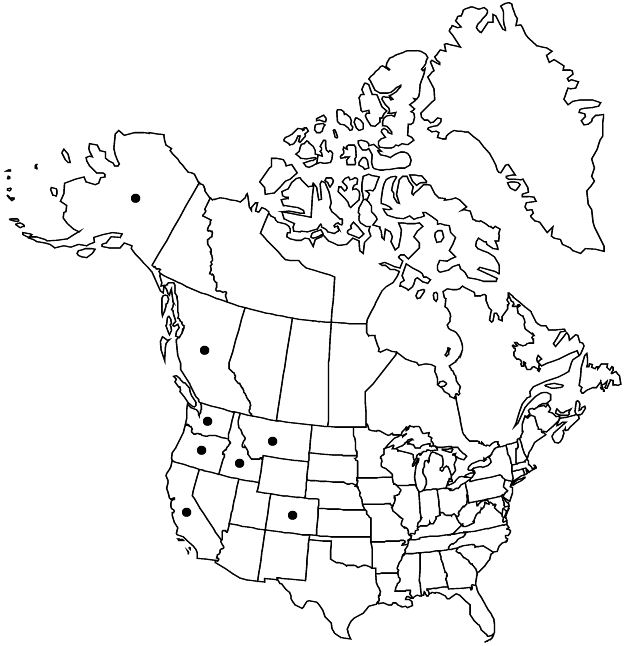Difference between revisions of "Spiraea douglasii"
Fl. Bor.-Amer. 1: 172. 1832.
FNA>Volume Importer |
RevisionBot (talk | contribs) m (Bot: Adding category Revised Since Print) |
||
| (8 intermediate revisions by 3 users not shown) | |||
| Line 13: | Line 13: | ||
}}{{Treatment/ID/Special_status | }}{{Treatment/ID/Special_status | ||
|code=F | |code=F | ||
| − | |label= | + | |label=Illustrated |
}} | }} | ||
|basionyms= | |basionyms= | ||
| Line 27: | Line 27: | ||
-->{{Treatment/Body | -->{{Treatment/Body | ||
| − | |distribution= | + | |distribution=B.C.;Alaska;Calif.;Colo.;Idaho;Mont.;Oreg.;Wash.;introduced in Europe. |
|discussion=<p>Varieties 3 (3 in the flora).</p><!-- | |discussion=<p>Varieties 3 (3 in the flora).</p><!-- | ||
| − | --><p>Spiraea douglasii has been popular in the garden trade and was used to develop a number of hybrids. In North America, the hybrid most likely to be encountered is S. ×billardii Hortus ex K. Koch, because the parental species are both native, although S. salicifolia was widely imported from Europe and thus S. ×pseudosalicifolia Silverside would also likely be encountered.</p> | + | --><p><i>Spiraea douglasii</i> has been popular in the garden trade and was used to develop a number of hybrids. In North America, the hybrid most likely to be encountered is S. ×billardii Hortus ex K. Koch, because the parental species are both native, although <i>S. salicifolia</i> was widely imported from Europe and thus S. ×pseudosalicifolia Silverside would also likely be encountered.</p> |
|tables= | |tables= | ||
|references= | |references= | ||
| Line 60: | Line 60: | ||
-->{{#Taxon: | -->{{#Taxon: | ||
name=Spiraea douglasii | name=Spiraea douglasii | ||
| − | |||
|authority=Hooker | |authority=Hooker | ||
|rank=species | |rank=species | ||
| Line 67: | Line 66: | ||
|basionyms= | |basionyms= | ||
|family=Rosaceae | |family=Rosaceae | ||
| − | |distribution= | + | |distribution=B.C.;Alaska;Calif.;Colo.;Idaho;Mont.;Oreg.;Wash.;introduced in Europe. |
|reference=None | |reference=None | ||
|publication title=Fl. Bor.-Amer. | |publication title=Fl. Bor.-Amer. | ||
|publication year=1832 | |publication year=1832 | ||
| − | |special status=Endemic; | + | |special status=Endemic;Illustrated |
| − | |source xml=https:// | + | |source xml=https://bitbucket.org/aafc-mbb/fna-data-curation/src/2e0870ddd59836b60bcf96646a41e87ea5a5943a/coarse_grained_fna_xml/V9/V9_683.xml |
|subfamily=Rosaceae subfam. Amygdaloideae | |subfamily=Rosaceae subfam. Amygdaloideae | ||
|tribe=Rosaceae tribe Spiraeeae | |tribe=Rosaceae tribe Spiraeeae | ||
| Line 79: | Line 78: | ||
}}<!-- | }}<!-- | ||
| − | -->[[Category:Treatment]][[Category:Spiraea]] | + | --> |
| + | |||
| + | [[Category:Treatment]] | ||
| + | [[Category:Spiraea]] | ||
| + | [[Category:Revised Since Print]] | ||
Latest revision as of 19:08, 6 November 2020
Shrubs, 10–30 dm. Stems erect to ascending, branched. Leaves: petiole 3–5 mm; blade bicolorous, elliptic to obovate, 3–10 × 0.5–4 cm, chartaceous, base cuneate, margins serrate distally from middle, venation pinnate craspedodromous, secondary veins prominent, apex acute to obtuse, abaxial surface lanate to tomentose, glabrous, or pubescent, adaxial glabrous. Inflorescences mostly terminal, conic panicles, [5–]8–25 × 3–6[–10] cm height 2–4 times diam. branches glabrous or glabrescent to tomentose. Pedicels 1–3 mm, glabrous or tomentose. Flowers 2–4 mm diam.; hypanthia hemispheric, 1 mm, abaxial surface tomentose, adaxial glabrous; sepals ovate, 1 mm; petals light to dark pink, ovate to obovate, 1–2 mm; staminodes 0; stamens 25–35, 2–3 times petal length. Follicles oblanceoloid, 2.5–3 mm, shiny, glabrous, adaxial suture sometimes ciliate.
Distribution

B.C., Alaska, Calif., Colo., Idaho, Mont., Oreg., Wash., introduced in Europe.
Discussion
Varieties 3 (3 in the flora).
Spiraea douglasii has been popular in the garden trade and was used to develop a number of hybrids. In North America, the hybrid most likely to be encountered is S. ×billardii Hortus ex K. Koch, because the parental species are both native, although S. salicifolia was widely imported from Europe and thus S. ×pseudosalicifolia Silverside would also likely be encountered.
Selected References
None.
Lower Taxa
Key
| 1 | Leaf abaxial surfaces lanate to tomentose. | Spiraea douglasii var. douglasii |
| 1 | Leaf abaxial surfaces glabrous or pubescent | > 2 |
| 2 | Pedicels, hypanthia, and sepals tomentulose to sparsely pubescent. | Spiraea douglasii var. menziesii |
| 2 | Pedicels, hypanthia, and sepals glabrescent or glabrous. | Spiraea douglasii var. roseata |